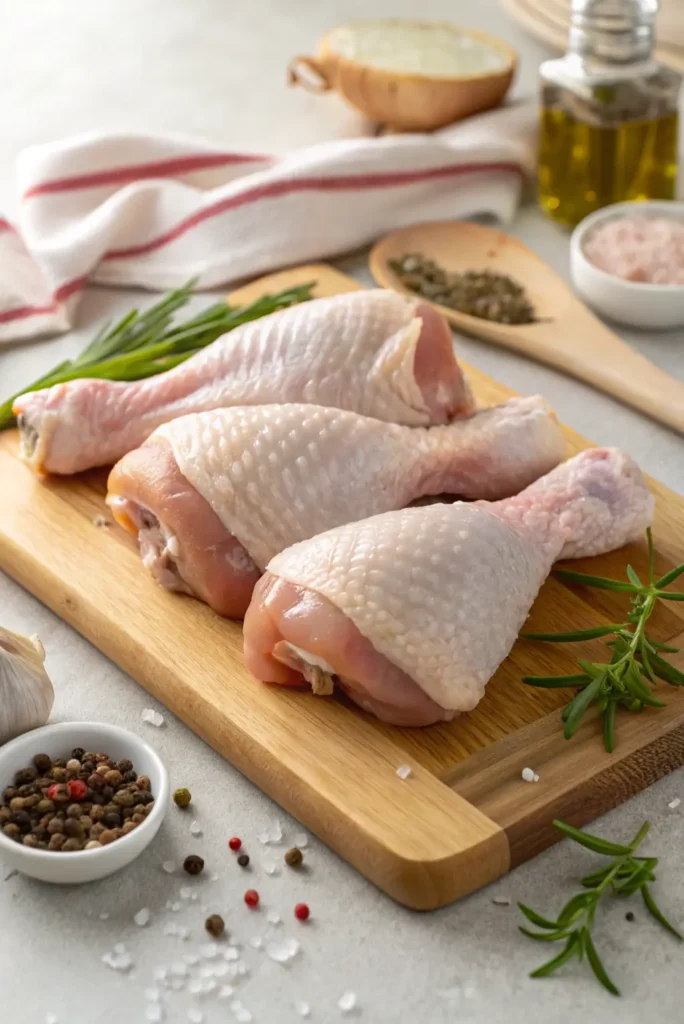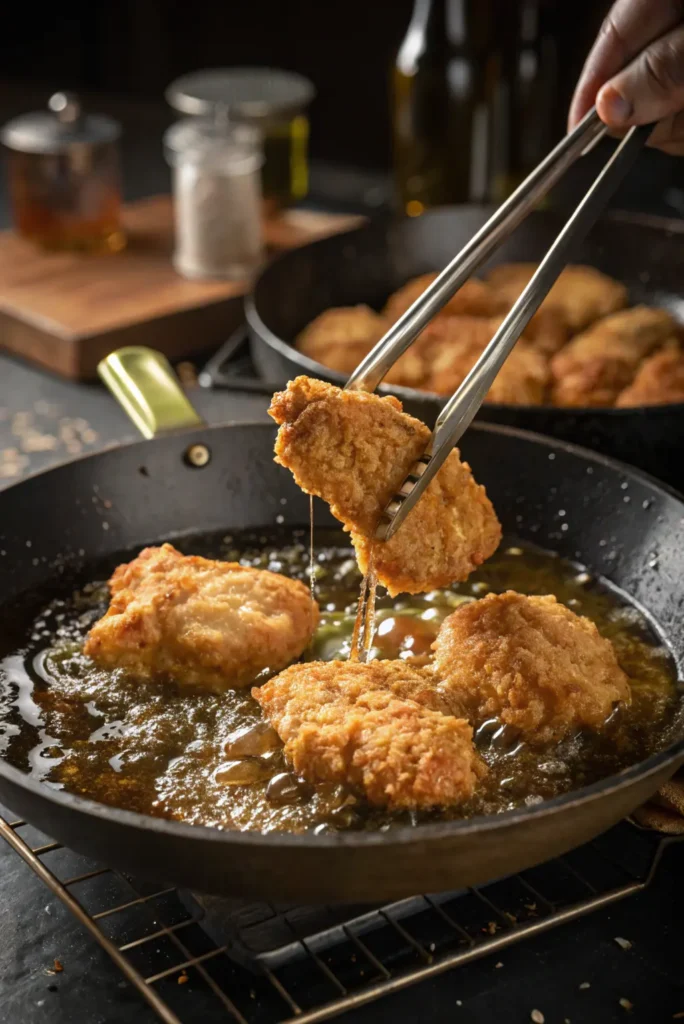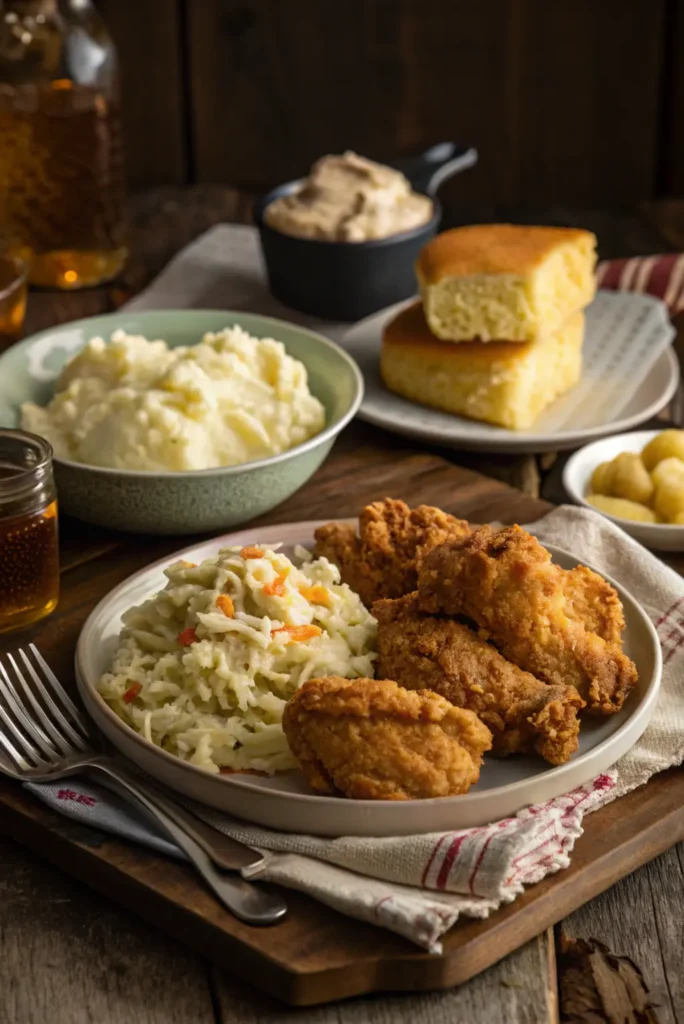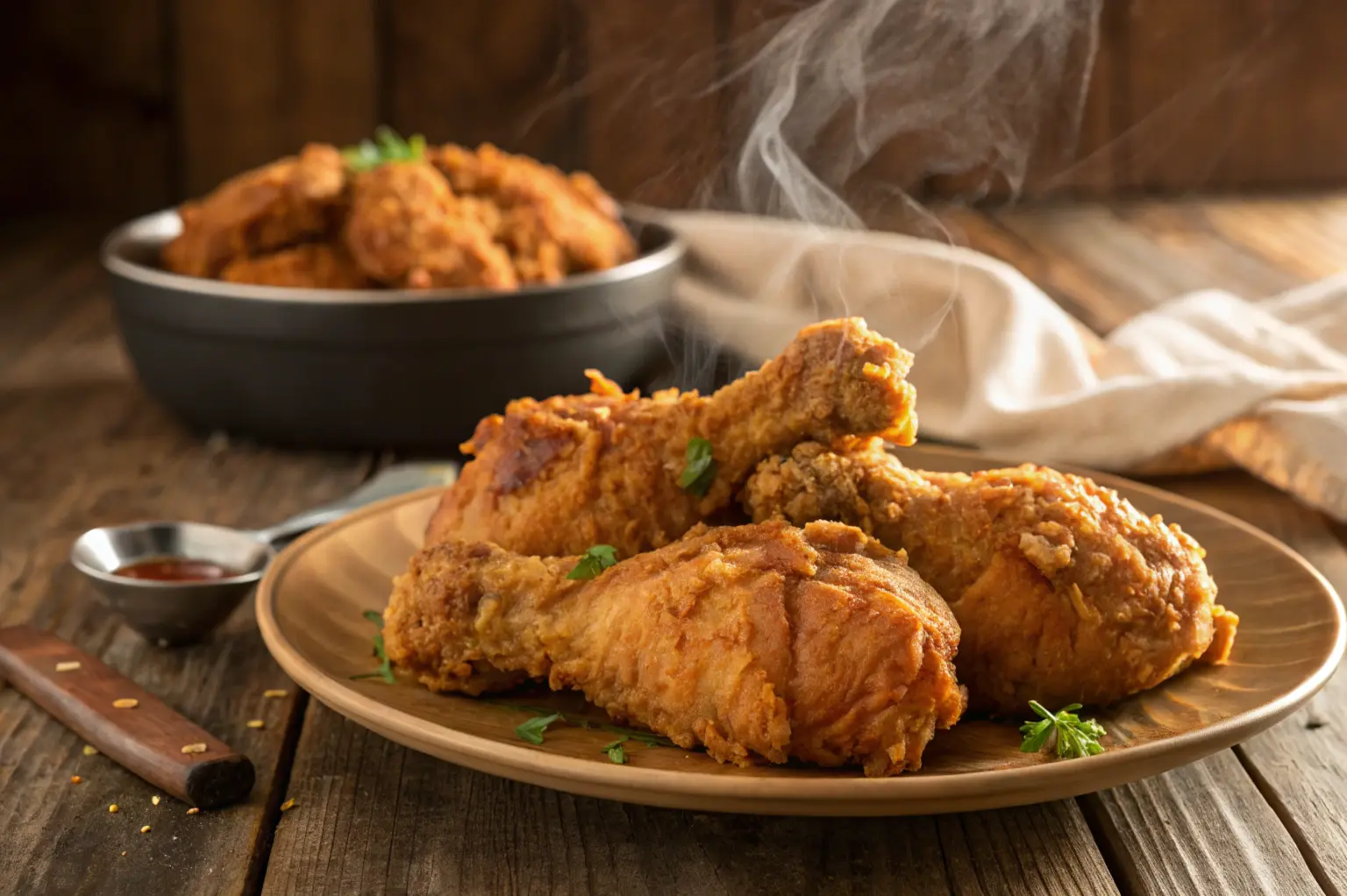If you’re a fan of crispy chicken, you’re not alone. That first crackling bite through a golden crust into juicy, tender meat is pure heaven. But getting that crunch just right at home? It can feel tricky. Luckily, you’re in the right place!
In this guide, we’ll dive deep into every juicy, crunchy detail. From picking the best chicken parts to choosing the right oil, from perfecting breading methods to avoiding common frying mistakes—this article has it all. We’ll even look at different styles like Southern fried chicken and Korean crispy chicken, plus storage and reheating hacks to keep that crispiness alive.
By the end, you’ll be frying up the best crispy chicken your kitchen has ever seen. Ready to take your crunchy game to the next level? Let’s jump right in!
Discover with us this easy and delicious recipe: Chipotle Chicken Recipe
Introduction to Crispy Chicken
What Makes Crispy Chicken So Irresistible?
There’s just something about crispy chicken that makes people weak in the knees. It’s not just about taste; it’s the texture that wins hearts. That satisfying crunch when your teeth sink into a perfectly fried piece sends signals of happiness straight to your brain. Plus, the juicy meat inside creates a mouthwatering contrast that’s simply unforgettable.
Texture plays a massive role in how we enjoy food. A tender but crunchy piece of fried chicken isn’t just delicious—it’s an experience.
The Science Behind the Crunch
Ever wonder why some fried chicken just doesn’t hit the spot? Well, it’s all about the science of moisture and heat. When chicken is dropped into hot oil, the water inside starts evaporating quickly, creating bubbles that fry the outer layer to crispy perfection. The flour coating also undergoes a chemical change, forming that irresistible crunchy chicken shell we all crave.
But hey, if your oil isn’t hot enough, your chicken will soak it up like a sponge—and nobody wants soggy fried chicken, right?
Here’s a quick cheat sheet for getting it spot-on:
| Factor | Ideal Range | Why It Matters |
|---|---|---|
| Oil Temperature | 325°F to 350°F (163°C to 177°C) | Prevents greasiness and burns |
| Internal Chicken Temp | 165°F (74°C) | Guarantees juicy, fully cooked chicken |
| Best Oils for Frying | Peanut, Canola, Vegetable Oil | High smoke points perfect for frying |
| Breading Thickness | Even, light coating | Helps even frying and avoids soggy spots |
Keeping your frying temp steady makes a huge difference. Even slight variations can mess with that golden finish!
Discover with us this easy and delicious recipe: recipesfreesh
Why Texture Matters in Fried Foods
Let’s face it—nobody dreams about soggy chicken. We crave that audible crunch that lets us know we’ve hit flavor gold. Texture isn’t just a nice bonus; it amplifies the entire eating experience. Every crispy bite unlocks layers of satisfaction, making your taste buds dance.
When food has a great texture, it feels fresher, lighter, and way more delicious. In short? Good texture makes good food amazing.
A Brief History of Crispy Chicken Across Cultures
While the American South made Southern fried chicken famous, cultures all around the world have their own versions. Ancient Chinese cooks were deep-frying meats thousands of years ago. In Japan, Karaage chicken became a street-food legend. Meanwhile, Korea took fried chicken to insane new levels with ultra crispy, double-fried masterpieces.
Each style has its own flair—different marinades, spice blends, and cooking methods—but they all chase one thing: that magical crispy chicken crunch.
Choosing the Right Chicken for Crispy Chicken Recipes

Best Cuts of Chicken for Crispy Chicken
Choosing the right part of the bird is half the battle when making mouthwatering crispy chicken. Some cuts naturally deliver more juicy, flavorful results than others. Thighs, drumsticks, and wings are often the top picks because they have a bit more fat. Fat means flavor, and flavor means better fried chicken!
But hey, don’t count out chicken breasts just yet. If you handle them properly—by marinating and not overcooking—they can turn out surprisingly crispy and tender. Here’s a quick guide:
| Chicken Part | Why It’s Good for Crispy Chicken |
|---|---|
| Thighs | Juicy, flavorful, hard to overcook |
| Drumsticks | Great size for even cooking |
| Wings | Maximum crunch-to-meat ratio |
| Breasts | Lean, but tasty with good marination |
No matter which cut you pick, choosing fresh chicken is crucial. Fresh meat holds moisture better, ensuring that juicy inside beneath the crunchy chicken coating.
Bone-in vs Boneless for Ultimate Crispiness
Both bone-in and boneless chicken can create that satisfying crispy chicken experience, but they each bring something different to the table. Bone-in pieces like thighs and drumsticks stay juicier during frying because the bone helps retain heat and moisture.
Meanwhile, boneless cuts cook faster and are easier to eat, making them perfect for dishes like crispy chicken tenders or sandwiches. It really depends on what you’re craving! If you want ultra-juicy fried chicken, go bone-in. If you want quicker, more uniform crispiness, boneless is the way to go.
Essential Ingredients for Perfect Crispy Chicken
The Ultimate Marinade for Juicy Crispy Chicken
A killer marinade is the secret weapon behind truly unforgettable crispy chicken. Without it, you risk dry, bland meat hiding under that beautiful crunch. Luckily, a simple buttermilk soak can do wonders. Buttermilk tenderizes the chicken while adding subtle tanginess that pairs perfectly with the savory, crunchy coating.
Besides buttermilk, many cooks add spices like paprika, garlic powder, cayenne, and black pepper to give the chicken layers of flavor. And honestly, you don’t have to stop there! Hot sauce, soy sauce, or even pickle juice can also amp up the magic.
Here’s a classic buttermilk marinade formula:
| Ingredient | Purpose |
|---|---|
| Buttermilk | Tenderizes, adds moisture |
| Paprika | Sweet smoky flavor |
| Garlic powder | Depth and savoriness |
| Cayenne pepper | Subtle heat |
| Salt & pepper | Essential seasoning |
Buttermilk, Spices, and Secret Ingredients
While buttermilk reigns supreme, some folks swear by adding secret ingredients to elevate their crispy chicken game even more. A dash of baking powder, for instance, helps boost the crispiness factor in the final crust. Cornstarch in the flour mix can also create a lighter, crisper texture.
And get this: some Southern chefs sneak a splash of pickle juice into the marinade for extra tangy magic. Sounds odd? Maybe. But your tastebuds will thank you later.
Choosing the Best Flour and Breading Techniques
When it comes to breading crispy chicken, not all flours are created equal. Traditional all-purpose flour works great, but adding cornstarch or potato starch can make a real difference. These starches fry up crispier and lighter, giving your fried chicken that restaurant-quality crunch.
A solid breading technique matters just as much. Here’s how to nail it:
- Pat the chicken dry first. Extra moisture leads to soggy breading.
- Dredge in seasoned flour. Don’t skimp on the seasoning—it’s where a lot of the flavor lives!
- Dip in buttermilk or egg wash. Helps the final flour layer stick like glue.
- Double dredge. For extra crunch, dip the chicken back into the flour a second time.
Double Dredge vs Single Coat for Extra Crunch
If you’re chasing extra crispy chicken, double dredging is your best friend. It’s exactly what it sounds like: after your chicken is dipped into the wet mixture and flour once, you repeat the process to build up an even thicker, craggier crust.
Single coating still works fine, especially if you want a lighter crunch. But double-dredged chicken? Oh boy, that’s the stuff dreams are made of. Crispy, crunchy, and packed with that addictive texture that makes you reach for “just one more” piece.
Proven Techniques for Cooking Crispy Chicken

Deep Frying vs Air Frying: Best Method for Crispy Chicken
When it comes to making crispy chicken, choosing the right cooking method makes all the difference. Traditional deep frying has long been the gold standard. It fully submerges the chicken, allowing it to cook evenly and form that golden, crunchy shell we all love. Plus, deep frying locks in moisture, keeping the inside tender and juicy.
But these days, air frying is giving deep fryers a run for their money. Air fryers use hot circulating air to mimic frying, but with a lot less oil. Although you won’t get quite the same deep crunch, air-fried crispy chicken can still turn out surprisingly crunchy, especially if you lightly spray it with oil before cooking.
So, which one’s better? If you’re craving that old-school, jaw-dropping crunch, deep frying wins. But if you want a slightly healthier twist without losing too much crisp, air frying is a fantastic option.
| Method | Pros | Cons |
|---|---|---|
| Deep Frying | Superior crunch, juicy inside | Higher oil use, more cleanup |
| Air Frying | Healthier, easier cleanup | Slightly less crunchy |
Temperature Tips for Perfect Frying
Even if you’ve got the best batter in the world, frying at the wrong temperature can ruin your crispy chicken. Trust me, you don’t want to wing it here.
Keep the oil between 325°F and 350°F. Too cool, and the chicken will soak up oil and turn greasy. Too hot, and you’ll burn the outside while leaving the inside raw. It’s also smart to fry in small batches to keep the oil temp steady.
Oh, and always let your chicken rest for a few minutes on a wire rack after frying. This prevents sogginess and keeps that delightful crunch intact!
Oven-Baked Crispy Chicken: Is It Possible?
Believe it or not, you can make crispy chicken in the oven too! It won’t be identical to deep frying, but it’s a solid choice if you’re avoiding fried foods.
Here’s the trick:
- Coat the chicken thoroughly in a mix of flour and breadcrumbs.
- Drizzle or spray a little oil over it.
- Bake at a high temp—around 425°F—for that much-needed crispness.
Turning the pieces halfway through baking also helps create an even crunch. Is it as crispy as deep-fried? Not quite. But it’s still pretty darn delicious and definitely healthier.
Crispy Chicken Recipes You Must Try
Southern-Style Crispy Chicken Recipe
When people think of crispy chicken, chances are their minds jump straight to Southern fried chicken. That rich, golden crust and juicy, flavorful meat underneath? It’s pure comfort on a plate.
To make classic Southern-style crispy chicken, you’ll need a solid buttermilk marinade, a well-seasoned flour coating, and the right frying technique. Here’s a basic rundown:
Ingredients:
- Chicken pieces (preferably thighs and drumsticks)
- Buttermilk
- All-purpose flour
- Paprika, garlic powder, cayenne, black pepper, salt
- Peanut or canola oil for frying
Simple Steps:
- Soak chicken in buttermilk and spices for at least 4 hours (overnight is better!).
- Dredge heavily in seasoned flour.
- Fry at 325°F until golden brown and crispy.
- Rest on a wire rack to stay crunchy.
Key Ingredients and Steps
The secret lies in the seasoning. Southern-style fried chicken isn’t just crispy—it’s packed with flavor inside and out. Don’t forget: seasoning your flour is just as important as seasoning your marinade!
Also, letting the coated chicken sit for about 15 minutes before frying helps the crust stick better during cooking.
| Key Ingredient | Purpose |
|---|---|
| Buttermilk | Tenderizes and flavors the chicken |
| Flour | Forms the crispy coating |
| Paprika | Adds color and mild spice |
Asian-Style Crispy Chicken Variations
If you’ve never tried Asian-style crispy chicken, you’re seriously missing out. Cultures across Asia have mastered the art of turning humble chicken pieces into ultra-crispy, flavor-packed bites.
Some favorites you need to try include:
- Korean Fried Chicken: Double-fried for maximum crunch and often glazed with spicy-sweet sauces.
- Japanese Karaage: Marinated in soy, ginger, and garlic, then fried to a light, crunchy perfection.
Korean Fried Chicken and Japanese Karaage
Both Korean and Japanese styles focus on lighter, crispier coatings compared to American Southern-style fried chicken. Korean recipes often use potato starch for the coating and finish with a sticky, spicy glaze. Meanwhile, Japanese Karaage uses a cornstarch dredge and keeps it simple with no sauce—just pure, juicy, crunchy chicken goodness.
Honestly, once you’ve tried these international twists, you’ll have a hard time picking a favorite!
Common Mistakes When Making Crispy Chicken
Why Your Crispy Chicken Turns Out Soggy
There’s nothing worse than putting in all that effort and ending up with soggy crispy chicken. Trust me, it happens more often than you think! Most of the time, it boils down to moisture. When chicken isn’t dried properly before breading, excess water messes up the crisping process. Instead of frying, the chicken steams—yikes!
Another big culprit? Frying at the wrong temperature. If the oil isn’t hot enough, the breading soaks up the oil instead of forming that gorgeous golden crust. And don’t forget—overcrowding the pan drops the oil temperature too fast, leading straight to disaster.
Here’s a quick cheat sheet to avoid sogginess:
| Mistake | Fix |
|---|---|
| Wet chicken before breading | Pat dry with paper towels |
| Cold oil | Preheat oil to 325°F–350°F before frying |
| Overcrowding | Fry in small batches |
A little attention to detail goes a long way. Before you know it, you’ll be cranking out consistently crunchy fried chicken every single time.
Moisture Control Tips
Want to keep your crispy chicken truly crispy? Moisture control is key. Always pat your chicken dry before breading. Some cooks even refrigerate their breaded chicken for 30 minutes before frying to firm up the coating—smart move!
Also, once it’s fried, never, ever pile chicken pieces directly onto each other. Always cool them on a wire rack so the steam can escape. That tiny tweak makes a world of difference.
Overcooking vs Undercooking: Getting It Just Right
Overcooking your crispy chicken leaves you with dry, chewy meat. Undercooking it? Well, that’s downright dangerous. You definitely don’t want either.
The solution is simple: use a meat thermometer. Chicken is perfectly cooked when it hits an internal temperature of 165°F. Plus, frying at the right oil temp ensures the outside gets crispy without burning while the inside cooks through.
In short, timing and temp checks aren’t just important—they’re non-negotiable if you want legendary crunchy chicken.
Serving Ideas for Crispy Chicken

Best Side Dishes to Pair with Crispy Chicken
Sure, crispy chicken steals the show, but killer side dishes turn it into a full-on feast. Classic sides like mashed potatoes and creamy coleslaw always hit the spot. But if you’re feeling adventurous, why not try spicy baked beans, roasted corn on the cob, or even a light, tangy cucumber salad?
Here’s a handy table of tasty pairings:
| Side Dish | Why It Works |
|---|---|
| Mashed Potatoes | Creamy contrast to crispy texture |
| Coleslaw | Fresh, tangy balance |
| Cornbread | Sweet and savory combo |
| Mac & Cheese | Comfort food heaven |
| Roasted Veggies | Light and healthy counterbalance |
A well-rounded plate not only looks better but also makes each bite more exciting.
Mashed Potatoes, Coleslaw, and More
Mashed potatoes bring that buttery, fluffy goodness that pairs perfectly with crunchy, golden fried chicken. Coleslaw, on the other hand, offers a cool, crisp, and slightly acidic counterpoint that cuts through the richness.
And let’s not forget: a warm, crumbly slice of cornbread dipped into your plate’s juicy remnants? Absolute bliss.
Honestly, you can mix and match sides depending on your mood. Southern, spicy, or even Asian-themed—crispy chicken plays nice with pretty much everything.
Delicious Sauces for Crispy Chicken
A perfect crispy chicken piece begs for the right sauce. Whether you like it sweet, spicy, or creamy, there’s a world of sauces to explore. Some classics include honey mustard, ranch, and spicy buffalo. Want to shake things up? Try a tangy Korean gochujang glaze or a creamy chipotle aioli.
| Sauce | Flavor Profile |
|---|---|
| Honey Mustard | Sweet and tangy |
| Buffalo Sauce | Spicy kick |
| Ranch Dressing | Cool and creamy |
| Gochujang Glaze | Sweet, spicy, umami-rich |
| Garlic Parmesan Sauce | Savory and buttery |
Spicy, Sweet, and Tangy Options
No matter your mood, there’s a sauce out there ready to elevate your crispy chicken to the next level. Sweet sauces mellow out the spice, while tangy ones brighten the richness. Feeling bold? A spicy glaze turns every bite into a flavor explosion you won’t soon forget.
Honestly, with the right sauces and sides, your crispy chicken spread could easily steal the show at any gathering!
Storing and Reheating Crispy Chicken Properly
How to Keep Crispy Chicken Crunchy Overnight
Let’s face it—crispy chicken is best fresh. But sometimes, you’ve got leftovers that you just can’t toss out. Good news: storing them the right way keeps them delicious for another round!
First off, avoid tossing hot chicken into airtight containers. That traps steam, making the coating soggy. Instead, let your chicken cool completely on a wire rack. Then, loosely wrap it in foil or place it in a container lined with paper towels. This allows excess moisture to escape while preserving the crunchy texture.
Here’s a quick table to make it easy:
| Step | Why It Matters |
|---|---|
| Cool completely before storing | Prevents trapped steam |
| Store with ventilation | Maintains crispy coating |
| Refrigerate within 2 hours | Keeps chicken safe and fresh |
Although it’s tempting to just toss it into any container, a little extra care goes a long way to keeping that signature crunchy chicken texture alive.
Best Containers and Storage Tips
When storing crispy chicken, using the right container is key. Choose shallow, ventilated containers over deep, airtight ones. If you’re stacking pieces, separate them with parchment paper to avoid sticking.
And whatever you do, never wrap the chicken tightly in plastic wrap—it practically guarantees a soggy, sad crust.
Reheating Methods That Preserve Crispiness
Now for the million-dollar question: how do you reheat crispy chicken without losing the crunch?
Here’s your best bet:
- Preheat your oven to 375°F.
- Place chicken pieces on a wire rack over a baking sheet.
- Bake for about 10–15 minutes until heated through and crispy again.
Microwaving is a big no-no unless you enjoy rubbery skin. An air fryer also works wonders if you have one—just a few minutes at 375°F brings it back to life!
Crispy Chicken for Different Diets
Gluten-Free Crispy Chicken Alternatives
Want to enjoy crispy chicken without the gluten? You’re in luck because there are fantastic alternatives that don’t skimp on flavor or crunch!
Swap out all-purpose flour for gluten-free options like rice flour, chickpea flour, or a gluten-free all-purpose blend. Adding a bit of cornstarch helps create that light, crackly texture everyone craves.
Here’s a table of popular gluten-free flours:
| Flour Type | Why It Works for Crispy Chicken |
|---|---|
| Rice Flour | Light and super crispy |
| Chickpea Flour | Nutty flavor and good texture |
| Cornstarch | Extra crunch when mixed in |
Best Breading Substitutes for Gluten-Free Diets
For gluten-free breading, don’t hesitate to get creative. Crushed gluten-free crackers, almond flour, or even puffed rice cereal can create a crunch almost identical to classic fried chicken.
Make sure to season your substitute just as heavily as you would traditional flour—you don’t want bland chicken after all your hard work!
Keto-Friendly Crispy Chicken Ideas
Following a keto diet doesn’t mean you have to give up on crispy chicken dreams! All you need is the right coating.
Instead of flour, many keto recipes use crushed pork rinds, almond flour, or even parmesan cheese to create a savory, crunchy coating.
Here’s a simple keto crispy chicken coating idea:
- Dip chicken in beaten eggs.
- Dredge in a mix of crushed pork rinds and almond flour.
- Bake or air fry until gloriously crunchy!
Keto crispy chicken doesn’t just match the flavor of traditional recipes—it often ups the savory, meaty flavor by a mile.
FAQs About Crispy Chicken
How Do I Make My Chicken Extra Crispy?
If you want your crispy chicken to reach legendary status, a few simple tricks can help. First, make sure you’re double dredging—dip in buttermilk or egg wash, then flour, and repeat for an extra-thick crust.
Second, adding cornstarch to your flour mix creates a lighter, crispier coating. And don’t forget, maintaining oil temperature between 325°F and 350°F is crucial. Too cool, and your chicken will be greasy instead of crunchy!
Honestly, with just a few tweaks, you can level up your fried chicken game instantly.
What Oil Is Best for Frying Crispy Chicken?
Choosing the right oil can make or break your crispy chicken. You’ll want one with a high smoke point to avoid burning the crust before the chicken cooks through.
The best oils for frying include:
Peanut oil (top choice for flavor and stability)
Canola oil (neutral and affordable)
Vegetable oil (easy to find and reliable)
Stick with these oils, and your crunchy chicken will come out golden and perfect every time.
Can I Make Crispy Chicken Without Deep Frying?
Absolutely! While deep frying is the traditional route, you can still make pretty darn good crispy chicken with an oven or air fryer.
For oven-baked versions, coat your chicken generously and bake at a high heat (around 425°F) with a quick spray of oil. For air frying, preheat your machine and lightly oil the chicken to achieve that coveted crunch.
It might not match deep frying 100%, but it’s still delicious—and way lighter.
How Do Restaurants Keep Chicken Crispy?
Ever wonder how restaurants serve piping hot crispy chicken that stays crunchy from kitchen to table? Here’s the secret: they fry the chicken perfectly, then hold it on wire racks under heat lamps.
Keeping the chicken elevated allows air to circulate, preventing steam from building up and ruining the crust. Plus, a quick second fry right before serving refreshes the crunch without overcooking the inside.
At home, a wire rack and a preheated oven at a low temp can achieve the same effect!
Is Baking Powder the Secret to Crispy Chicken Skin?
You bet! Baking powder isn’t just for cakes—it’s a secret weapon for extra crispy chicken. Adding a bit to your flour or seasoning helps create tiny bubbles in the crust as it fries.
The result? An even lighter, airier texture that crackles when you bite into it. It’s a small addition with a huge payoff, especially if you love super crunchy chicken.
Conclusion:
Final Tips for the Perfect Crispy Chicken Every Time
Making the ultimate crispy chicken at home might seem tricky at first, but with the right techniques, it becomes second nature. Remember to dry your chicken thoroughly, double dredge it for extra crunch, and maintain a steady oil temperature.
Don’t be afraid to experiment with flavors too! Whether it’s spicy Korean glazes or Southern buttermilk marinades, the sky’s the limit when it comes to delicious fried chicken.
Also, using the right tools—like a thermometer and wire rack—makes a huge difference. Small steps add up to crispy, juicy results that taste like they came straight from a pro kitchen.
Encouragement to Experiment and Enjoy
At the end of the day, making crispy chicken should be fun, not stressful. Try new marinades, test out different coatings, and don’t worry if the first batch isn’t perfect.
Every time you fire up that fryer or preheat that oven, you’re getting closer to fried chicken greatness. Enjoy the journey, savor every crunchy bite, and share the goodness with friends and family!
Because honestly? Life’s just better with a plate full of hot, golden, crispy chicken.

